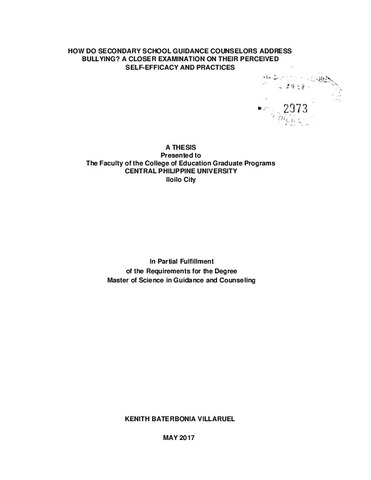How do secondary school guidance counselors address bullying? A closer examination on their perceived self-efficacy and practices

Page views
1,235Дата
2017Автор
Thesis Adviser
Defense Panel Chair
Share
Metadata
Показать полную информацию
Аннотации
This descriptive study was conducted to determine the school counselors’ self-efficacy and practices in addressing bullying in public and private secondary schools in Iloilo City. The respondents of the study were 73 secondary school guidance counselors. A one-shot survey research design was used. The data were processed and analyzed using Statistical Package for Social Sciences (SPSS). Results of the study showed that guidance counselors in Iloilo City are generally females, middle-aged, married, have earned units in the master’s program in guidance and counseling, have attended or participated to relevant trainings related to bullying, are non-registered guidance counselors, and have low perceived self-efficacy. It also showed that guidance counselors strongly endorsed three strategies in dealing with bullying such as working with the bully, enlisting other adults, and working with the victim. There was also a difference in their practices as male guidance counselors tend to deal with victims of bullying as compared to females. Guidance counselors perceived that they can deal effectively with the victims of bullying.
Описание
Abstract only
Suggested Citation
Villaruel, K. B. (2017). How do secondary school guidance counselors address bullying? A closer examination on their perceived self-efficacy and practices (Unpublished Master's thesis). Central Philippine University, Jaro, Iloilo City.
Type
ThesisТематика
Keywords
Department
School of Graduate StudiesDegree
Master of Science in Guidance and CounselingShelf Location
GSL Theses 371.4072 V713
Physical Description
xii, 98 leaves
Collections
The following license files are associated with this item:



